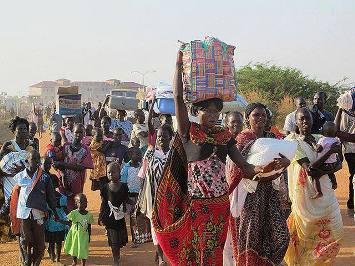South Sudan needs help to avoid collapse: official
July 1, 2014 (JUBA) – South Sudan’s government admitted on Monday that it needs international assistance to avoid collapse in the coming months triggered by the outbreak of conflict in mid-December last year.

Speaking to Sudan Tribune on Tuesday, foreign affairs ministry spokesperson Mawien Makol Arik dismissed South Sudan’s ranking as the world’s most “fragile state” in an index compiled by US-based Fund for Peace (FPP).
Some of the key factors cited for the ranking included fractious leadership, mass killings and ethnic violence.
However, Arik insists the government is taking more concrete steps to manage the crisis in comparison to other conflict-affected states at the top end of the index.
“After the fighting started in December, within one month, the government accepted to [take part in] talks to the rebels and we are succeeding,” said Arik.
His comments follow remarks by deputy parliamentary speaker Mark Nyipuoc last week, who said it was unfair to compare a new nation like South Sudan to more established countries.
He likened South Sudan to a two-year-old child that had not had adequate time to fully develop and mature.
The report, released last week, displaced Somalia from the top spot for the first time in six years.
However, Arik said the indicators considered by the organisation could not be managed by South Sudan alone, calling for more international support to address the current crisis.
“We (South Sudan) unfortunately went into crisis that turned our country [away] from [the] development path to humanitarian management,” he said.
“We can be a failed state if the international community stands idle,” he added.
South Sudan gained independence from Sudan in July 2011 following a referendum promised in a 2005 peace deal that ended more than two decades of civil war.
Since then the world’s newest nation has struggled to maintain law and order and deliver essential services, with corruption alleged to have siphoned off billions of public money.
In 2012, president Kiir wrote to 75 current and former senior government officials requesting they return $4 billion in funds.
Machar, has openly criticised Kiir’s leadership style since his sacking last July, claiming that massive corruption and nepotism are rife and that the ruling Sudan People’s Liberation Movement (SPLM) had lost its vision.
Officials in Machar’s rebel faction said last week they were unsurprised by South Sudan’s top ranking on the list.
Machar’s spokesman, James Gatdet Dak, slammed comparisons between the county and a child, saying it was the government’s responsibility to ensure the country’s affairs were well managed.
“Even if we were to take that line of argument which likens South Sudan to a two or three-year-old child, we would also have expected the child to grow like a normal, healthy child. The so-called child should have crawled fast, walked and even run by year three, 2014. These are the assuring positive indicators of a healthy growth into adolescence and adulthood,” Dak told Sudan Tribune on Sunday.
“Unfortunately the reverse has happened as the child is paralysing, a clear indicator that it is not a healthy child. This is a grave concern to the people of South Sudan and to the sympathising world at large,” he added,
The Failed State Index is compiled annually by the FFP based on an assessment of 12 key social, economic and political indicators, including demographic pressures, poverty and economic decline, human rights and political impasse.
The top six most fragile states were all in Africa, including Sudan at number five, with Afghanistan, Yemen, Haiti and Pakistan rounding out the top 10.
(ST)
